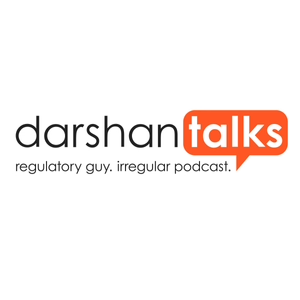
DarshanTalks Podcast
Darshan Kulkarni
Welcome to DarshanTalks!
We demystify fraud for legal, regulatory, and compliance essentials in the life sciences and pharmacy industries. Through engaging 15-30-minute interviews with influential change makers, short educational regulatory defbriefs, and 60 second audio takeaways, we unveil the strategies behind bringing drugs and devices to market—and keeping them there!
Powered By The Kulkarni Law Firm - Helping regulators see your business the way you do.
We focus on life science issues involving medical affairs, marketing and advertising, and clinical research so that you can learn about the industry, enhance your business and grow your career.
All episodes
Best episodes
Top 10 DarshanTalks Podcast Episodes
Goodpods has curated a list of the 10 best DarshanTalks Podcast episodes, ranked by the number of listens and likes each episode have garnered from our listeners. If you are listening to DarshanTalks Podcast for the first time, there's no better place to start than with one of these standout episodes. If you are a fan of the show, vote for your favorite DarshanTalks Podcast episode by adding your comments to the episode page.
FAQ
How many episodes does DarshanTalks Podcast have?
DarshanTalks Podcast currently has 168 episodes available.
What topics does DarshanTalks Podcast cover?
The podcast is about Life Sciences, Pharma, Pharmacy, How To, Advertising, Podcasts, Education, Science and M&A.
What is the most popular episode on DarshanTalks Podcast?
The episode title 'Legal Minute: 3 FTC rules for winning comparative claims' is the most popular.
What is the average episode length on DarshanTalks Podcast?
The average episode length on DarshanTalks Podcast is 6 minutes.
How often are episodes of DarshanTalks Podcast released?
Episodes of DarshanTalks Podcast are typically released every 2 days, 19 hours.
When was the first episode of DarshanTalks Podcast?
The first episode of DarshanTalks Podcast was released on Aug 27, 2023.
Show more FAQ

Show more FAQ